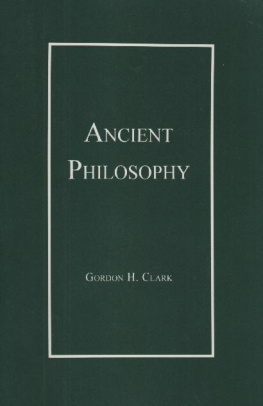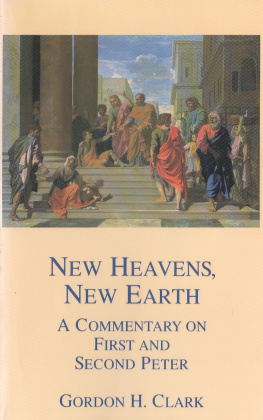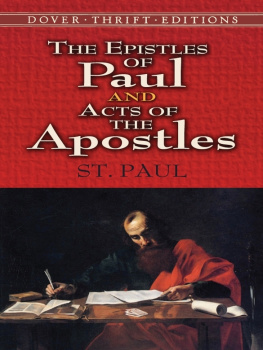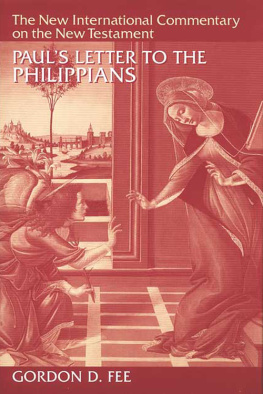Gordon Haddon Clark - Commentaries on Pauls Epistles
Here you can read online Gordon Haddon Clark - Commentaries on Pauls Epistles full text of the book (entire story) in english for free. Download pdf and epub, get meaning, cover and reviews about this ebook. year: 2005, genre: Religion. Description of the work, (preface) as well as reviews are available. Best literature library LitArk.com created for fans of good reading and offers a wide selection of genres:
Romance novel
Science fiction
Adventure
Detective
Science
History
Home and family
Prose
Art
Politics
Computer
Non-fiction
Religion
Business
Children
Humor
Choose a favorite category and find really read worthwhile books. Enjoy immersion in the world of imagination, feel the emotions of the characters or learn something new for yourself, make an fascinating discovery.
- Book:Commentaries on Pauls Epistles
- Author:
- Genre:
- Year:2005
- Rating:5 / 5
- Favourites:Add to favourites
- Your mark:
- 100
- 1
- 2
- 3
- 4
- 5
Commentaries on Pauls Epistles: summary, description and annotation
We offer to read an annotation, description, summary or preface (depends on what the author of the book "Commentaries on Pauls Epistles" wrote himself). If you haven't found the necessary information about the book — write in the comments, we will try to find it.
Commentaries on Pauls Epistles — read online for free the complete book (whole text) full work
Below is the text of the book, divided by pages. System saving the place of the last page read, allows you to conveniently read the book "Commentaries on Pauls Epistles" online for free, without having to search again every time where you left off. Put a bookmark, and you can go to the page where you finished reading at any time.
Font size:
Interval:
Bookmark:
T he problem of New Testament textual criticism is very difficult, and therefore hard to explain to the general public. For a more definite reason it is also hard to explain to ministers, seminary students, and even to the professors themselves. Yet its importance and ramifications are such that the ordinary worshiper as he sits in church on Sunday mornings, or as he reads his Bible at home, cannot escape its effects.
Most Christians in this country know no Greek, but nearly all recognize that there are competing translations of the Bible. There is the King James Version of noble ancestry; there are the American and now the New American Standard Version , the New International Version , and several versions that are more paraphrases than translations (all bad), the Roman Catholic Jerusalem Bible, and translations of all or parts of the Bible by individuals rather than by committees. Surely these different translations confuse the ordinary reader at several places. Can he find a basis for making an intelligent choice? Without guaranteeing infallibility, I think he can, sometimes.
But congregations, not to insist on individuals, during the second half of this century, have been perplexed, pummeled, plagued, and sometimes pleased by the plethora of new proposals. The Session of one church banished the King James and ordered the pastor to use only the New International Version in the pulpit. A year later they discarded the New International Version and made the New American Standard their official Bible. Advertisers of the several versions castigate the King James for its archaic terminology. True, it contains some antiquated words, though their number is usually exaggerated.The one or two new versions which merely replace an obsolete word with its contemporary counterpart are to be commended. But most of the new versions change
the familiar terms simply for the sake of change. The result may be neither better nor worse: It is merely different.
Examples from the Old Testament
Here are some examples. Psalm 3:1 reads, Lord, how are they increased that trouble me (King James) . The New American Standard has O Lord, how my adversaries have increased. The Revised Standard Version puts it, O Lord, how many are my foes. Aside from the fact that the Revised Standard Version omits the verb, the translations are equally accurate.The Hebrew word means both troubles and adversaries. But troubles is an easier and more familiar word than adversaries. Hence the new translation can neither claim to have replaced an obsolete word, nor even to have substituted an easier one.
Psalm 91:4 is another example of change for the sake of change.The new word is even less familiar to contemporary Americans than the King James word. The King James has, He shall cover thee with his feathers. The Hebrew word means feathers or wings. The Revised Standard Version and the New American Standard change feathers to pinions. Of course, pinions is a perfectly good English word, but it is less popularly used than feathers or wings. Nor is it a more accurate translation. Hence this seems to be change for the mere sake of change.
The first verse of the well-known Isaiah 53 begins with Who hath believed our report? (King James). The Hebrew of the last word means announcement, doctrine, news, report, rumor, or tidings. The Revised Standard Version changes the single word to the phrase what we have heard. This seems to make it a reference to what Isaiah heard, rather than to what he preached.The New American Standard makes better sense: our message. Now, the words message and report are both common English words, so that any claim to clearer English or to the removal of archaic expressions has no basis.
To be sure, no one can legitimately forbid new translations, especially the present writer, for I have deliberately made some very harsh translations in my commentaries. The reason was to imitate Greek constructions and to shake sleepy readers out of their inattentive perusal of a printed page. Legitimate though they be, they are not attempts to replace the King James nor would they be suitable for the formal reading of the Scripture in the Sunday morning service.
New Testament Examples
Matthew 5:18: Till Heaven and Earth pass, one jot or one tittle shall in nowise pass from the law, till all be fulfilled (King James). The Revised Standard Version has Till Heaven and Earth pass away, not an iota, not a dot, will pass away until all be accomplished. Worse is the New English Bible fi So long as Heaven and Earth endure, not a letter, not a stroke will disappear from the Law until all that must happen has happened. The New International Version has, Until Heaven and Earth disappear, not the smallest letter, not the least stroke of a pen, will by any means disappear until everything is accomplished.
The English word jot seems to have been derived from the Greek word (iota), which is the name of the letter i. On this point the Revised Standard Version is the best of the quoted translations, for modern speech hardly recognizes jot as iota. But there is no good reason for changing tittle into dot , nor into stroke , and not the least stroke of a pen is an inexcusable paraphrase.
The word tittle is, to be sure, an unusual word in English. But there is none much better. It means a point or small sign used as a diacritical, punctuation, or similar mark, the dot over an i or j, a vowel point in Hebrew. The verb which the King James translates fulfilled is literally has become. Fulfill and accomplish are both proper, though the latter is no real improvement over the former. Totally unacceptable is the phrase until all that must happen has happened.
Luke 1:1: Forasmuch as many have taken in hand to set forth in order a declaration of those things which are most surely believed among us... (King James). Inasmuch as many have undertaken to compile a narrative of the things which have been accomplished among us... (Revised Standard Version) The author toTheophilus. Many writers have undertaken to draw up an account of the events that have happened among us (New English Bible).
Forasmuch as this study aims generally to support the King James Version as being better or at least as good English as the new versions, it is only just to point out a deficiency now and then. The phrase most surely believed among us receives no support either from the critical texts or from the majority (Byzantine) manuscripts.The wording have been accomplished is quite satisfactory. But compile a narrative is distinctly inferior to taken in hand, both from the standpoint of easily understood English and of correct translation.The word for hand ( \cheir]) is the root embedded in the verb. Even the phrase to set forth in order is a fair translation of the infinitive there. (anatasso) means to arrange in a row, to draw up in order. The New English Bible's transposition of Theophilus from the end of verse 3 to the beginning of verse 1 is merely mildly amusing.
The well-known words of John 14:18 are, I will not leave you comfortless. The last word in Greek is orphans. The New English Bible has bereft ; the Revised Standard Version has desolate. I can approve the New International Version when it says orphans because it is a more accurate translation; but bereft and desolate are neither better translations than comfortless, nor are they a simpler English that avoids an alleged archaism. They seem to indicate a desire merely to be different.
Acts 7:54 describes the effect of Stephens speech before the Sanhedrin: they were cut to the heart and they gnashed on him with their teeth (King James) . The Revised Standard Version has they were enraged and they ground their teeth against him. They were furiousis the New International Versions translation.The inimitable who would want to imitate it? - New English Bible has,This touched them on the raw and they ground their teeth with fury. Now, the Greek text has the word hearts. Since this is no strange word, a translator should not change it. The verb means to cut to the quick. It also occurs in Acts 5:33 without the word heart. Perhaps gnashed is an uncommon word these days, and hence the Revised Standard Version's ground their teeth can be considered an improvement. But the Revised Standard Versions enraged and the New International Versions furious are neither more accurate translations, rather less accurate, nor simpler English.
Font size:
Interval:
Bookmark:
Similar books «Commentaries on Pauls Epistles»
Look at similar books to Commentaries on Pauls Epistles. We have selected literature similar in name and meaning in the hope of providing readers with more options to find new, interesting, not yet read works.
Discussion, reviews of the book Commentaries on Pauls Epistles and just readers' own opinions. Leave your comments, write what you think about the work, its meaning or the main characters. Specify what exactly you liked and what you didn't like, and why you think so.












